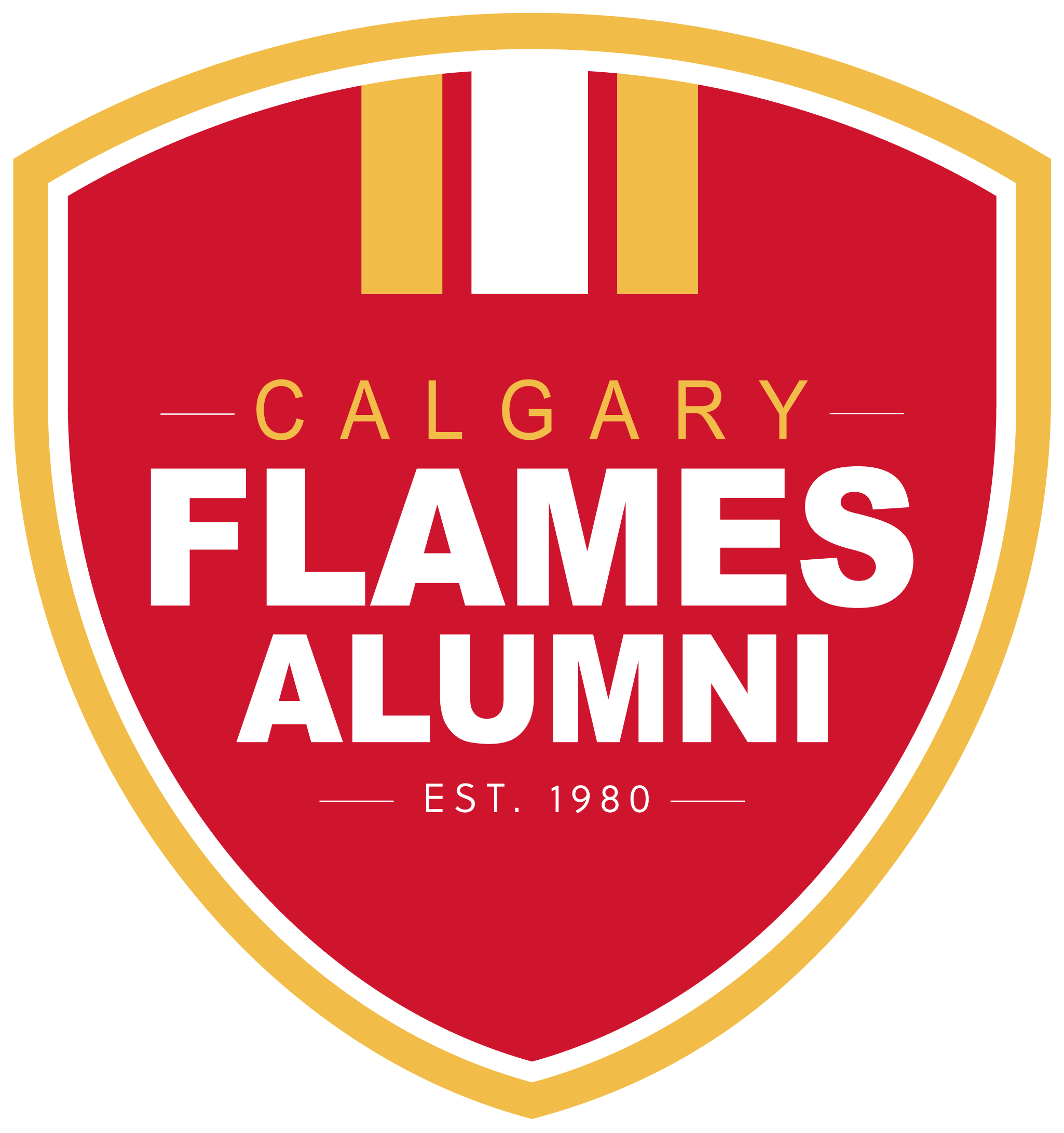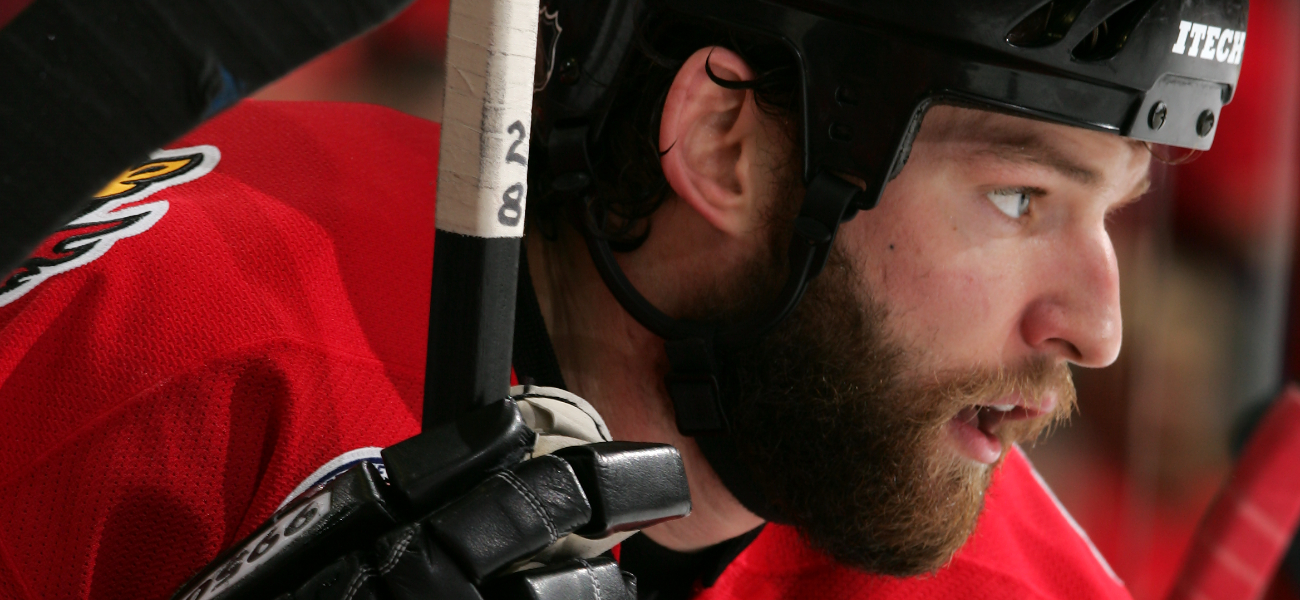Sitting there in the Ed Whalen Media Lounge on Jan 11, 2016, flanked by cronies like Craig Conroy (ready, willing and oh-so-able to fill a notebook or voice recorder file) and mentors like Brian Burke (silver hair cascading backwards, tie stylishly askew) Robyn Regehr felt totally at his ease.
No sense of feeling somehow adrift.
Suddenly untethered.
Nothing like the sensation of impending doom that victims of his Tunnel of Doom victims felt, trying to maneuver the pathway down Regehr’s prime real estate, those right-hand boards, deep into Calgary Flames’ territory.
The same sensation many others had felt when the finality of retirement jolted them as hard a Regehr shoulder-to-shoulder molar-loosener.
“I just viewed it,” remembers the long-time Rock-‘Em Sock ‘Em guardian of Miikka Kiprusoff’s galaxy, “as chapters in a book.
“That I was moving on to another chapter in my life.
“The hockey side was one or two chapters. Great chapters, don’t get me wrong. But I didn’t want to have just hockey define me as a person. I viewed it as something I ‘did’ but not something I ‘was.'”
The then 35-year-old linchpin had been approached by the club about symbolically signing a one-day contract to end a 15-season NHL career as a part of the organization he was still most associated with.
Oh, sure, he’d gone off to L.A. and helped the Kings collect a Stanley Cup in let’s-do-lunch land but Calgary was where he’d started it all, where’d he’d beaten the odds coming back from a horrific car crash that broke both his legs at age 19, where he’d spent 11 winters and made his name, honed his craft.
“I felt it was a good way to close the loop,” is how the explains the moment now.
“We knew we were going to make Calgary our home. And my parents at that time had the ability to come and be a part of it, which was a huge highlight for our family, and for them.”
The transition from the ice lanes to the corporate world had been ongoing.
“I think,” he says now, “the important thing was having other interests and exploring them while I was still playing.
“You’re stuck in planes, airports, hotel rooms and on buses. A lot. So there’s no shortage of time for reading. I was interested in business and things outside the game.
“I’d started my first business, Blueline Oil Field Rentals, in 2008, still in the middle of my career.”
Now in its 12th year of operation, Blueline provides rental equipment for use in exploration and drilling with a primary focus on Heavy Weight Drill Pipe Rentals.
“If you look book on the evolution of the game, in the ’50s and ’60 guys had a second job in the summertime,” Regehr reminds you.
“What’s happened I feel is that the economics of hockey have changed but also the attitude. People nowadays are hyper-focused on hockey; that kid growing up is single-tracked on the game at a younger age and then managed by his parents and a team of people around him – agent, nutritionist, trainer, you name it, to become the best hockey player he can be. Little Johnny may grow up to be a great player but in a lot of cases he becomes quite one-dimensional.
“That was something I tried to be aware of. I didn’t want to fall into that trip.
“Because let’s face facts: Most NHL careers are not very long and when you come out of them you’re still a very young age in terms of life-expectancy so what are you then going to do with that lot of life you have left?”
The aspects of the hockey lifestyle most players cherish, – teamwork, camaraderie, structure – can, Regehr stresses, be found in other environments. All you need do is look.
“For me, it was in small business.
“You want to have a high-performing team in your business. There are different roles and responsibilities in the business. You have certain goals you set and you go back and check in on them. Are we performing at a high level where we want to be or are we not, and do we make changes?
“All that kind of stuff goes right back to the hockey world.
“So there is actually quite a bit of correlation.
“There are major differences, too, of course. As a player you’re told where to be, when to be there, what to eat, how to dress. You name it. A life in hockey is just so super-structured.
“Compare that with a small business in the oil and gas industry around Alberta. Especially in the past four or five years. The problems that we deal with in our industry and not the same as when, say, you’re sitting in a penalty-kill meeting. They’re much more dynamic, there’s so much more that goes into it.
“That’s very challenging.”
For Regehr, at least, the obvious option of remaining somewhere in hockey in some capacity was never really an option at all.
“To be involved, stay involved, in hockey would’ve been the easy – no, the comfortable – way, I guess,” he acknowledges.
“But I just didn’t feel like I was as engaged as I should be, as I’d have to be, to do that. To be in the hockey business, in any business, you need to be all in.
“I was looking forward to new challenges.
“Look at my career as a snapshot. You spend hundreds of hours, thousands of hours, learning to play the game and improving over time, working your way up to finally reaching the peak, which is the NHL.
“Now you have to go from that peak to the bottom again, of what what you’ve chosen to do next. How do you do that? You have to working your way up. Understanding what the customer would like. The challenges. People you need on the team.
“That’s hard to do sometimes. But it’s part of learning, of trying to grow.”
“As I told you,” he repeats, “by that time we had that press conference and I signed that one-day contract, I was already well into the next chapter of the book.”
A chapter still being written.

